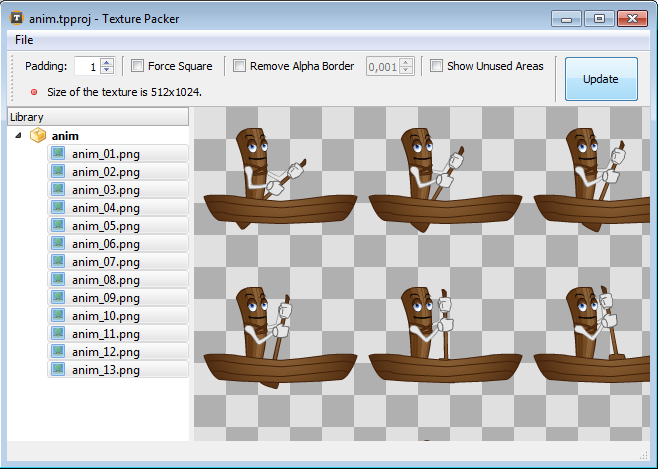Difference between revisions of "TexturePack"
| Line 1: | Line 1: | ||
__NOTOC__ | __NOTOC__ | ||
| − | '''Supported platforms:''' android | + | '''<translate>Supported platforms</translate>:''' [[File:Platform android]][[File:Platform ios]][[File:Platform mac]][[File:Platform pc]]<br/> |
| − | '''Available since:''' Gideros 2011.6<br/> | + | '''<translate>Available since</translate>:''' Gideros 2011.6<br/> |
| + | '''<translate>Inherits from</translate>:''' [[Special:MyLanguage/TextureBase|TextureBase]]<br/> | ||
=== <translate>Description</translate> === | === <translate>Description</translate> === | ||
| − | <translate>The | + | <translate>The `TexturePack` class specifies a texture pack (or texture atlas). A texture atlas is a large image which contains many smaller sub-images.<br /> |
Gideros supports dynamic creation of texture atlases and pre-packed texture atlasses by using "Gideros Texture Packer" tool.<br /> | Gideros supports dynamic creation of texture atlases and pre-packed texture atlasses by using "Gideros Texture Packer" tool.<br /> | ||
<br /> | <br /> | ||
<br /> | <br /> | ||
| − | + | <h3>Dynamic Creation of Texture Packs</h3><br /> | |
<br /> | <br /> | ||
| − | To create a texture pack dynamically (at run-time), create | + | To create a texture pack dynamically (at run-time), create `TexturePack` object with a table of file names of textures.<br /> |
<br /> | <br /> | ||
| − | + | <pre><code>local pack = TexturePack.new({"1.png", "2.png", "3.png", "4.png")}</code></pre><br /> | |
<h3>Static Creation of Texture Packs</h3><br /> | <h3>Static Creation of Texture Packs</h3><br /> | ||
<br /> | <br /> | ||
| Line 19: | Line 20: | ||
<br /> | <br /> | ||
<br /> | <br /> | ||
| − | This tool exports two files: A | + | This tool exports two files: A `.txt` file that specifes the positions of texture regions and a `.png` file of packed texture.<br /> |
Use these two files to create texture pack:<br /> | Use these two files to create texture pack:<br /> | ||
<pre><code>local pack = TexturePack.new("pack.txt", "pack.png")</code></pre><br /></translate> | <pre><code>local pack = TexturePack.new("pack.txt", "pack.png")</code></pre><br /></translate> | ||
{|- | {|- | ||
| style="width: 50%; vertical-align:top;"| | | style="width: 50%; vertical-align:top;"| | ||
| − | |||
=== <translate>Methods</translate> === | === <translate>Methods</translate> === | ||
[[Special:MyLanguage/TexturePack.new|TexturePack.new]] ''<translate>creates a new TexturePack object</translate>''<br/> | [[Special:MyLanguage/TexturePack.new|TexturePack.new]] ''<translate>creates a new TexturePack object</translate>''<br/> | ||
Revision as of 09:29, 24 August 2018
Supported platforms: File:Platform androidFile:Platform iosFile:Platform macFile:Platform pc
Available since: Gideros 2011.6
Inherits from: TextureBase
Description
The `TexturePack` class specifies a texture pack (or texture atlas). A texture atlas is a large image which contains many smaller sub-images.
Gideros supports dynamic creation of texture atlases and pre-packed texture atlasses by using "Gideros Texture Packer" tool.
<h3>Dynamic Creation of Texture Packs</h3>
To create a texture pack dynamically (at run-time), create `TexturePack` object with a table of file names of textures.
<pre><code>local pack = TexturePack.new({"1.png", "2.png", "3.png", "4.png")}</code></pre>
<h3>Static Creation of Texture Packs</h3>
To create a pre-packed texture atlas, use "Gideros Texture Packer" tool:

This tool exports two files: A `.txt` file that specifes the positions of texture regions and a `.png` file of packed texture.
Use these two files to create texture pack:
<pre><code>local pack = TexturePack.new("pack.txt", "pack.png")</code></pre>
MethodsTexturePack.new creates a new TexturePack object |
EventsConstants |